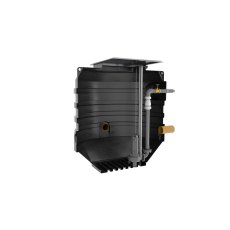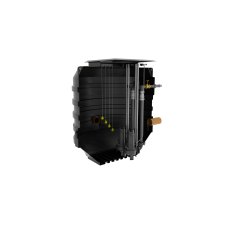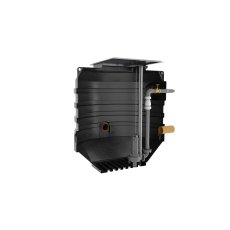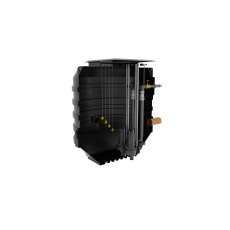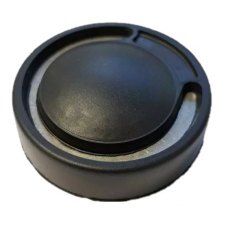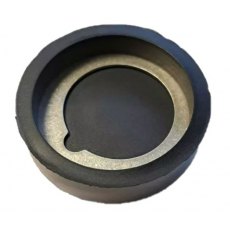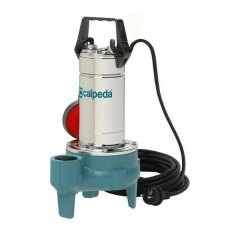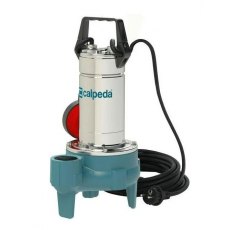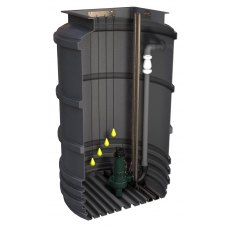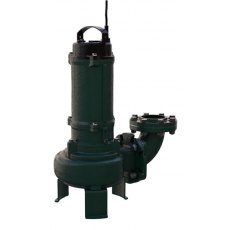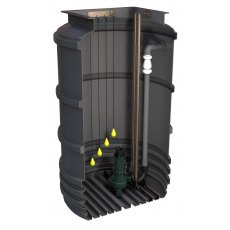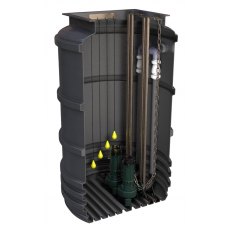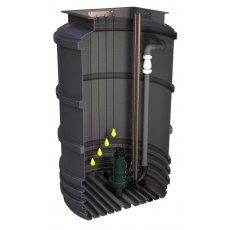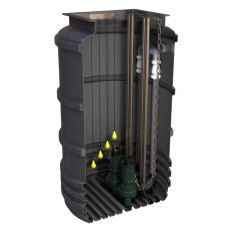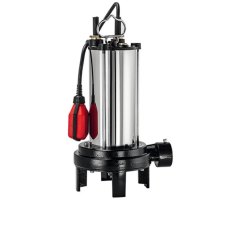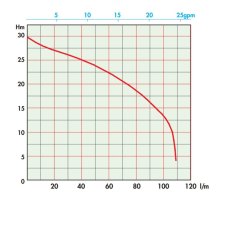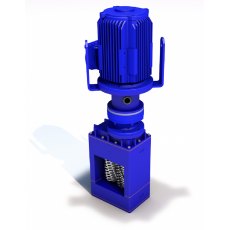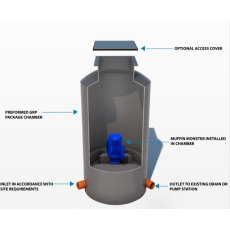Grinder Pumps FAQs
Does a sump pump need regular maintenance?
Sump pumps are essential components of any home's plumbing system, as they are responsible for keeping the basement or crawlspace dry by removing excess water. However, like any other machine, sump pumps require regular maintenance to ensure that they are operating properly and efficiently. It is important to understand that sump pumps have a limited lifespan and, depending on the specific model, are typically expected to last up to ten years.
If you do not perform regular maintenance, the sump pump may fail prematurely, resulting in costly repairs or even a flooding incident. Regular maintenance should include checking the sump pump for any signs of corrosion or damage, such as rust or cracks, and checking electrical connections to make sure they are tight and secure. You may also want to insect your sump pump for any debris or blockages that may prevent it from working properly.
You can regularly test your sump pump to make sure it is working properly by filling up a bucket with water and placing it near the sump pump's inlet. If the pump does not turn on when the bucket is filled, you may have a problem.
Should a sewage pump run continuously?
Ideally, you should try and avoid running a sewage pump continuously and only run it intermittently. This lowers the risk of overloading and damage to the pump in the long run.
It's important to consider the size of the pump and the amount of wastewater it will be moving. If the pump is too small, it won't be able to handle the amount of wastewater it needs to move and will eventually burn out. On the other hand, if the pump is too large, it will be wasting energy and money to run it continuously. Most sewage pumps are also designed to run intermittently to conserve energy and reduce costs, so keeping it running all the time is not the most cost-effective use of this product.
What is a Vortex Impeller Sewage Pump?
Vortex impeller sewage pumps use centrifugal action. In this sewage pump. the impeller rotates and causes a tornado-like action that pulls the waste into the pump and then sends it into the discharge pipe with little or no contact with the impeller which helps the pump to withstand any stringy material it may encounter. This means there is a much lower chance of clogging the impeller.
To see our range of sewage pumps click - https://www.tanks-direct.co.uk/waste-water-tanks/waste-water-pumps/sewage-pumps/c1039
What type of sewage pump do I need?
Sewage pumps are available in a few different options including effluent pumps, grinder pumps or macerator pumps and submersible pumps. Effluent pumps remove the grey wastewater that stays in your septic tank after the solids have settled and are good for residential and small commercial applications.
Grinder pumps or macerator pumps collect wastewater from your household appliances and fixtures including toilets, washing machines, and bathtubs. Grinder or macerator pumps works by the pump grinding the waste into a fine slurry before pumping it to your septic tank when the water in the tank reaches a certain level from a holding tank to collect waste. Submersible pumps are used for residential, commercial, and agricultural applications.
If you are unsure of the type of sewage pump you need, we are more than willing to help. Please give us a call or send us an email.
How does a sewage pump work?
Used to transfer waste liquids and solids from one place to another, a sewage pump is often referred to as a submersible sewage pump since the pump is submerged most of the time. Sewage pumps have a motor that rotates an impeller to create pressure that pushes the waste into a discharge pipe. In residential applications, the sewage is generally pumped from a sewage basin to a sewer system or a septic tank. Sewage pumps can be manual, automatic or dual mode, where the pump can be used as both manual and automatic. It is not recommended to use a manual sewage pump inside of a sewage basin due to the risk of sewage overflow.
How do you install a sewage pump?
Removing the pump
- Begin by isolating the effected pump by switching to ‘Off’ on the control panel facia. Please note: if the pumping station will be remaining in service — with the other pump working on its own — it is essential that the effected pump controls are disabled by isolating or removing fuses.
- Disconnect the effected pump motor cables at the control panel terminals, carefully noting the terminal positions for each wire. Plug off the cable entry hole at the panel.
- Close the control panel door and return the main isolator to ‘On’.
- Lift the effected pump clear of the chamber using the lifting chain provided. Please check the pump weight before attempting to manual lift. If specified on ordering, lifting equipment will have been supplied. The coupling fitted to the pump permits it to be removed and refitted simply by lifting it clear with the chain, the pump assembly sliding up and down the guide rail. No manual disconnection of pipework is required, and it is therefore not necessary for personnel to enter the chamber to remove a pump for servicing.
- Hose the pump off thoroughly.
Pump refitting
- Check the effected pump switch on the control panel facia is still in the ‘Off’ position and switch the main isolator to ‘Off’.
- Lower the pump back down into the chamber on its guide rail, using the lifting chain provided. When in position on its pedestal, its own weight will lock the pump discharge connection into position.
- Re-connect the pump cable at the panel terminals, taking care to ensure the gland entry is properly re-sealed.
- Refit or re-connect fuses as required.
- Close the panel door and switch the main isolator back to ‘On’. Reset the pump switch to ‘Auto’ mode and check for correct operation of both pumps through a complete set of cycles in accordance with the procedures in ‘Start up’.
How long do sewage pumps last?
With the right care and maintenance, your sewage pump should last for many years. There are, however, several factors that will affect the lifespan of your sewage pump. If your sewage pump is not correctly installed to begin with, its lifespan will decrease. That is why we recommend your sewage pump is installed by a fully qualified engineer. We’d also advise that your sewage pump is regularly serviced to identify any potential issues and prevent it getting blocked. With the correct installation and ongoing maintenance, sewage pumps have the potential to last for over 30 years.
Which sewage pump is the most efficient?
Effluent pumps are generally more efficient than other sewage pumps as they are only pumping grey water. However, the effluent pumps may not be suitable for your use. The most efficient sewage would be the one that is most suited to your application and system size. If you are unsure of the type of sewage pump you need, we are more than willing to help. Please give us a call or send us an email.
Does every house need a sewage pump station?
Sewage pumping stations are needed when gravity cannot be relied upon to move wastewater and sewage towards the main sewer line. Perhaps there is a lack of gravitational flow if, for example, the sewage is situated below the main sewer level and would need to be pumped upwards. Maybe the sewer is obstructed by a ridge or there is no gravity system in place. In these circumstances, installing a sewage pump station could be much cheaper and just as effective as installing a sewage system with gravitational flow.
You’ll find many advantages to having a sewage pump station installed at your property. They can be fitted with alarms so that you will be notified if there are any problems with the system. Sewage pump stations also work automatically so there is minimal human contact. This reduces the risk of health issues.
How long should a sewage pump run?
Your sewage pump should not run constantly. Usually it should run from 10 to 15 seconds until the float switch detects the water level has dropped adequately. It will then cut off. If your sewage pump is running constantly it may need to be serviced, repaired or replaced. The average life expectancy of a sewage pump is about 10 years.
To see our full range of sewage pumps click - https://www.tanks-direct.co.uk/water-tanks/pumps/sewage-and-waste-water-pumps/c1049
How do i know if my sewage pump is working correctly?
You may need to service or replace your sewage pump is you find the following: -
- If the water at the discharge point is dirty or brown
- The pump is not working at all or sounds like it’s struggling to pump
- Your pump is constantly running and doesn’t switch off even though no one is using the facilities in the building
- Sewage is backed up into the building
- There is a smell of sewage
- There is no fluid emptying from the holding tank
- There is no power to the pump
If you do require a Service, please give a ring to arrange.
Will my sewage pump need maintenance?
Yes, it is cost effective to get your sewage pump regularly maintained to lengthen the life of the pump. Typically pump servicing will include: -
- Cleaning out the sump chamber
- Cleaning of pumps and float switch
- Electrical test of pumps and all floats
- Checking all cables for damages and general wear
When should variable speed pumps be used?
Variable speed pumps should be used in any installation where the pump duty is not constant. If a pump duty is constant a fixed speed pump may be the most cost-effective option. However, even in fixed duty applications there may be an advantage to running a pump below its maximum speed. A motor running at 80% of its maximum speed uses 48% less energy.
What type of water pump is right for me?
Choosing the right water pump for your needs is essential for effective water maintenance. We stock a wide range of water pumps, so first you need to determine the type of water pump you need.
Wastewater or sewage pumps move wastewater from one part of a system to another. We offer a range of wastewater pumps in different capacities and configurations and come with a variety of features.
If you live in an area with low water pressure, our booster pump sets can increase the water pressure in your home or office.
Chemical pumps are designed to move fluids containing hazardous chemicals without risking exposure or damage to the pump or surrounding equipment.
Pressurised pumps are used to transfer fluids that require pressurisation.
Made from a composite material of glass reinforced polyester, GRP pump enclosures are highly durable and offer excellent protection from the elements.
Submersible pumps are a type of water pump that can be submerged underwater to pump out water. This type of pump is typically used in flooded areas or to pump out water from ponds, wells, or other water sources.
Swimming pool and garden pumps circulate water in a swimming pool or pond. The pumps work by creating suction to draw water from the pool or pond, and then using an impeller to push the water through a filter.
Our flood kits have what you need in the event of a flood.
Are there any disadvantages to using variable speed pumps?
1. Vibrations
Although running pumps below their maximum speed will tend to reduce overall system noise, altering the speed of a pump may result in structural resonances that would not occur at the pump's maximum speed. This may cause vibration which can be harmful to equipment and cause an increase in noise at certain frequencies. There are a number of products that help to alleviate these potential issues.
2. Higher initial cost
Because of the added complexity of an inverter drive, variable speed pumps and systems which include variable speed pumps will cost more initially than a fixed speed equivalent. However, this additional cost is invariably outweighed by the long-term energy cost saving.
What are the main types of water pump available?
Here at Tanks Direct we have a huge selection of water pumps available.
Wastewater or sewage pumps are used to move wastewater, or water that contains solids and contaminants, from one place to another. They are commonly used in various industrial, commercial, and residential applications to move wastewater from a source to a sewage treatment plant or to another location entirely.
Booster pump sets are used to increase water pressure. Booster pumps work by taking in water at a low pressure and increasing it to a higher pressure with a centrifugal impeller. Booster pump sets are ideal for areas where the water pressure is too low to provide adequate water flow.
GRP pump enclosures are made from a composite material of glass reinforced polyester (GRP). Requiring little maintenance, GRP pump enclosures are highly durable and offer excellent protection from the elements and corrosion.
Submersible pumps are designed to operate while completely submerged in a fluid.
Swimming pool and garden pumps are used to circulate water in swimming pools, hot tubs, water features, and gardens. They keep the water free of debris and maintain the desired water temperature. The pump typically pulls water from the pool or garden and pushes it through a filtration system before returning it to the pool or garden.
What is the best water pump for flooding?
Submersible pumps are very good at dealing with groundwater flooding and rainfall. Designed to operate underwater, they work by using electric motors to draw water from flooded areas and divert it away from buildings and other areas that need to remain dry. Submersible pumps are commonly used to drain water from flooded basements and other areas that are prone to flooding.
We stock a wide range of submersible pumps, that are easy to install and maintain. They can be connected to pipes and other water control systems, allowing for quick and easy water removal in the event of flooding. They are designed to operate in a wide range of temperatures and conditions and are typically constructed from corrosion-resistant materials that can withstand long periods of exposure to water. Our submersible pumps are often equipped with protective measures, such as float switches and check valves, to prevent any damage to the motor or pump should the water start to rise too quickly.
Also known as sump pumps, submersible pumps are a type of centrifugal pump that can be operated when fully submerged underwater. Sealed so the electrics are protected, our range of submersible pumps can be used for a variety of applications including puddle drainage, swimming pool pumps, pond and water feature pumps, and drainage pumps.
On my Water Pump it mentions about head height. What is this and how do I work out what I require?
Head is the height in which the pump is lifting the waste, measured from cover level of the pump station, to the cover level of the discharge manhole. With this measurement we can ensure we supply a pump powerful enough to lift the waste up that high. We will need to know this and also the distance that it is pumping to make sure the pump quoted is suitable.
Why variable speed pumps?
When you consider all the pumping that occurs globally, whether in large industrial plants or in domestic heating systems, this accounts for almost 20% of the world's energy consumption. Because of this there is a huge opportunity in the pumping industry to make a significant contribution to using our energy resources efficiently. In pumping applications where the duty required is not constant, it is highly likely that installing a variable speed pump will result in significant energy savings - likely to be between 30% and 50% in many applications.
Other benefits of variable speed pumps include:
1. Improved reliability
Because variable speed pumps run at speeds below their maximum, there is a reduction in wear, particularly in mechanical seals.
2. Improved control
Variable speed pump controller can monitor small variations in pressure and make adjustments accordingly. This also means there is less liklihood of sudden changes in flow or pressure.
Do waste pumps need servicing and if so, how often should this be done?
Waste pumps and your wastewater system in general need regular servicing to keep it in working order. A general desludging of your system and a check of the components such as the sewage pump will keep the sewage treatment system in good working order for longer.
Generally, a good rule of thumb for servicing your sewage pump would be every 1 to 2 years or every time you empty your septic tank. It is a good idea to get it checked regularly to avoid a costly replacement further down the line.
When to choose a 65mm or 80mm vortex pump over a 50mm vortex pump
If you are concerned about the risk of blockages but also need a flow rate which macerator pumps can’t provide, or even if it’s purely just a faster flow rate you need, a larger 65mm or 80mm pump will be able to achieve this, calculating a specific flow rate to your application is difficult and would be best speaking to a member of our technical team to help specify the right pumps for your station.
Why choose a macerator pump over a vortex pump?
If you have an application where the risk of blockages that could enter the drain run is higher than usual, for example if the property is rented, tenants could unwillingly block the pump, this is also a problem if it is an apartment block as you wouldn’t be able to source who was responsible for blocking It, but everyone would need to pay their share to fix it.
Also, macerator pumps, because of how they cut through the waste, they can pump a much higher head (vertical distance), so when compared to vortex pumps, if you have anything over 10m, you will need to be selecting macerator pumps. Always check the pump flow curves for your application or you can call to speak to one of our technical team if you want to be sure the pumps will do the task at hand.
Automatic Pump - what does this mean?
An automatic pump is a pump that will automatically turn itself on and off as the liquid level rises and falls. These pumps are usually longer lasting as they do not burn out but switch off automatically if there is no liquid to pump therefore, they do not run dry.
Horizontal vs Vertical pumps
This depends on your existing pump and the type of installation you have or are planning on. The vertical Hippo 50 has a vertical port discharges via a 2” female port and the horizontal Hippo 50 discharges via a horizontal 2” female port but is also DN50 flanged
What is a Grinder Pump?
A grinder pump takes the wastewater from the holding tank, grinding any waste into a fine slurry and then pumps it into a sewage treatment plant. They can pump over much longer distances but at a slower rate because they are high pressure and low volume pumps.
To see our grinder pumps click - https://www.tanks-direct.co.uk/semisom-125-gr-automatic-submersible-grinder-pump/p5628
What is a submersible pump?
A submersible pump means that the pump needs to be submerged or covered in liquid specifically the type specified on the pump such as water, wastewater, sewage etc.
Do I need a macerator?
Macerator pumps are used only for heads higher than 10m and with a low flow rate when you have a discharge rate restriction imposed by the water authority who own the sewer you discharging into.
Is there an option to have an enclosure for my pump set?
If a booster or compact set is being housed externally, you will need an enclosure to protect the inverter from the elements so anything electronic needs to be protected by an enclosure of some sort, never leave the booster set to face the elements
How much space do I require around my pump?
You require at least 500mm above the break tank so you can service it and inspect it when required. Also, a booster just needs to be installed in a maintainable space so that the inverters can be reviewed if needed via clear walkways and facing into the room, not tucked away down the side of a plant room.

 Login
Login